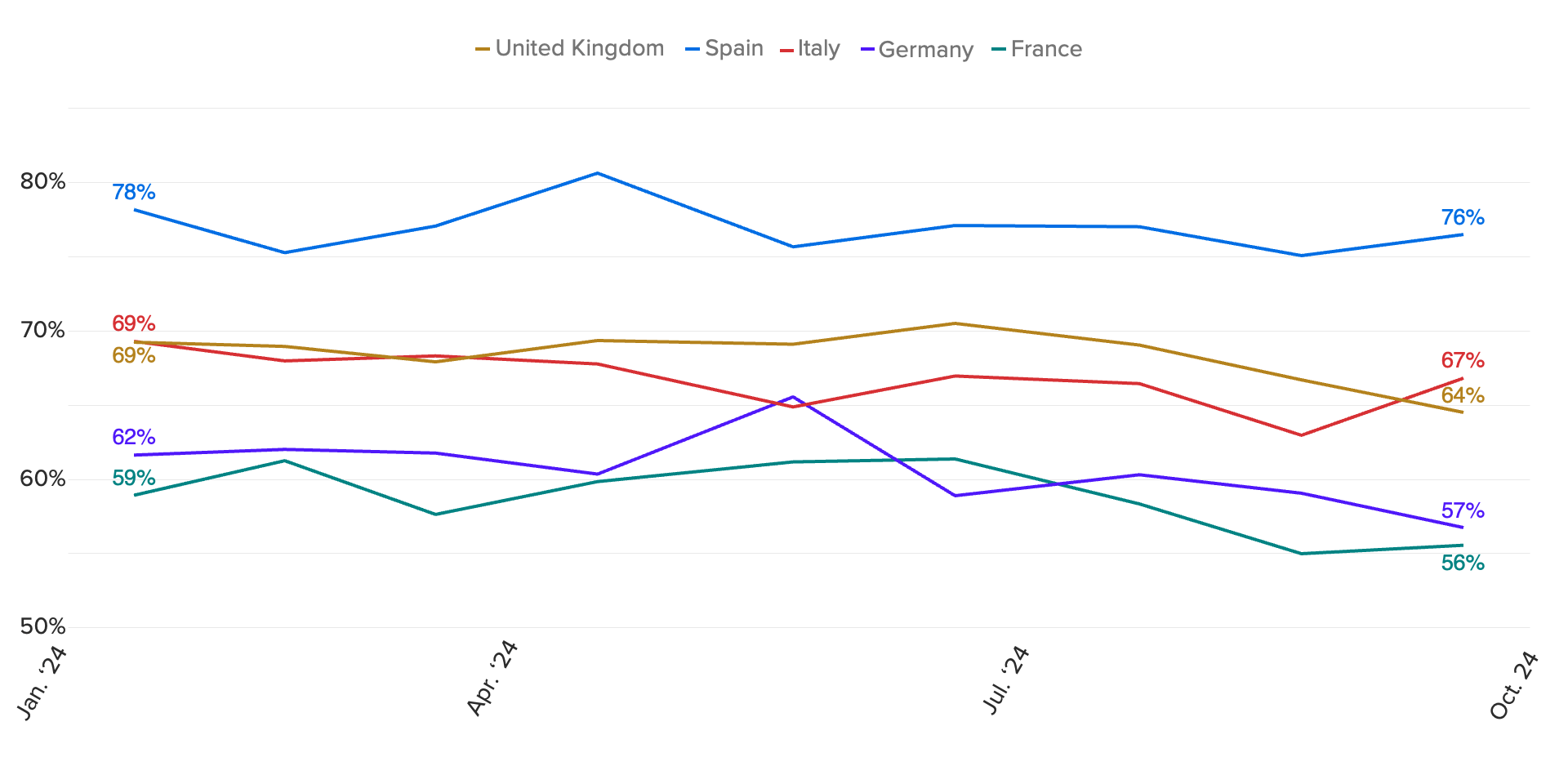European Support for Corporate Activism Has Declined in 2024

Key Takeaways
Western Europeans’ support for corporate action on climate change, unionization, abortion access, racial equality and transgender rights all declined over 2024/YTD, even as their support continues to exceed that of U.S. consumers.
The declines were driven primarily by consumers in Germany, followed by those in the United Kingdom. But France, Spain and Italy also saw modest declines in some areas.
The declines are cross-cutting, but consumers’ support for corporate action on racial equality saw the largest average dip, mirroring declining public support for immigration in Western Europe.
If this trend continues, we advise planning for a gradual shift in communication around corporate activism in the European context, both to the public and to policymakers in Brussels.
European CEOs who view stringent E.U. ESG requirements as anti-competitive may also look to these trends — particularly on climate change — as a way to shore up their request that Brussels take a lighter touch.
For our latest analysis (and takes) on major geopolitical developments, sign up for our bimonthly newsletter Counter/Consensus.
Morning Consult’s Global Corporate Purpose Tracker follows consumers’ expectations surrounding corporate activism and gauges global trust in business, while diving deeper into the expectations of global consumers around corporate action on key social issues. In the most recent update published today, the data shows declining support for corporate activism in a part of the world famous for its high environmental standards, strong social safety net and progressive social attitudes: Western Europe.
Europeans’ demand for corporate action has declined across several areas
Since January 2024, there has been a decline in average public support for corporate action on hot-button social issues across the five largest European economies: France, Germany, Italy, Spain and the United Kingdom. Of the issues we examine — climate change, unionization, abortion access, racial equality and transgender rights — the largest decline has been in support for corporate action on racial equality.
Average Western European support for corporate activism has declined on several fronts

The downtrend in public support is broad, but its magnitude varies by country
Although average public support for corporate action has declined across the board, it has done so by different amounts in different markets. For racial equality in particular, while support for corporate action has held more steady in Southern Europe — Italy and Spain both saw smaller declines of 2 percentage points each, within the margin of error for each country’s surveys — Germany and the United Kingdom each saw significant 5-point drops.
German and U.K. consumers are driving declines in support for corporate action on racial equality

In Germany, support declined gradually over the course of the year. In the United Kingdom, however, support was flat and quite strong at around 70% for most of the year, only beginning to decline around August.
Not coincidentally, this was also when London was wracked by waves of anti-immigrant protests in the aftermath of misinformation identifying the assailant in a knife attack as a migrant. The same trend can be seen in U.K. views on immigration, lending support to the idea that shifts in political views feed through into consumers’ views on corporate activism.
U.K. riots have coincided with declining support for immigration

Germany and the United Kingdom saw the biggest declines
Germany saw some of the largest declines overall in support for corporate activism on traditionally liberal social issues like LGBTQ+ rights, followed by the United Kingdom. Other countries in the group varied more substantially by issue.
Consumer expectations of corporate action on social issues in ______

A shift to the ideological right may equal a downshift in demand for corporate activism
Groups of consumers who hold traditionally liberal views on hot-button social issues are more likely to want companies to take a stance on them, with some exceptions. So one could fairly interpret this secular decline in demand for corporate activism as a general shift in the share of the population that favors traditionally progressive politics.
Indeed, Europe has seen a spate of national and local elections in 2024 in which right-wing parties have challenged the status quo using platforms favoring lower immigration and greater independence from the European Union — an institution that is often perceived as synonymous with stringent environmental regulation and social progressivism. In Germany specifically, the far-right party Alternative for Germany (AfD) has had recent successes at the state level which may be playing a role in encouraging the expression of more typically right-wing views among consumers. While U.S.-style diversity efforts are still a novelty in Germany, declining public support for corporate action on them could make it less likely that they become widespread.
Western Europe is still a bastion of ESG relative to the United States
It is still true that Western European consumers in general exhibit stronger support for corporate activism relative to those in the United States. When asked about their support for corporate action on climate change, for example, consumers in all of five European markets we examine show markedly higher support for corporate action than U.S. consumers. In short, the decline we are seeing in Europe is from a high base.
Global consumer expectations of corporate action on climate change
Factor this trend into long term communications and government relations strategies
Nevertheless, given the trend in European sentiment it would be unwise to discount the possibility of further declines that could affect corporates active in the European market in a number of ways. The first is the most straightforward: While corporate communicators do not need to dramatically change their messaging in the next few months to get ahead of potential reputational risks (as Western European consumers’ support for corporate engagement is still quite high), they should instead plan to gradually adapt their public narratives in the first half of 2025 to reflect lower public support for corporate activism in these markets, should the trend persist.
Additionally, European CEOs who have long complained about stringent E.U. ESG requirements disadvantaging them relative to their overseas competitors may look to these trends, particularly on climate change, as a way to shore up their request that Brussels take a lighter touch. Farmer protests earlier this year were in part driven by frustration over E.U. rules on pesticide bans, water usage and carbon taxes. Those protests certainly got E.U. lawmakers’ attention, likely increasing their interest in heading off further public discontent over environmental measures. If general public opinion continues to slowly turn against corporate engagement on environment and social issues more broadly, the private and public sectors will both take note.
Sonnet Frisbie is the deputy head of political intelligence and leads Morning Consult’s geopolitical risk offering for Europe, the Middle East and Africa. Prior to joining Morning Consult, Sonnet spent over a decade at the U.S. State Department specializing in issues at the intersection of economics, commerce and political risk in Iraq, Central Europe and sub-Saharan Africa. She holds an MPP from the University of Chicago.
Follow her on Twitter @sonnetfrisbie. Interested in connecting with Sonnet to discuss her analysis or for a media engagement or speaking opportunity? Email [email protected].